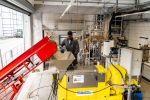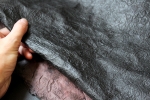Baden-Württemberg and its companies
Bioeconomy refers to the sustainable management of renewable natural resources, which is why there is no such thing as a bioeconomy industry in the traditional sense. However, there are companies in Baden-Württemberg that use biomass as raw material base and have already developed products and processes in their effort to act more sustainably
The energy producer badenova uses male corn plants to produce renewable natural gas (RNG). The company circumvents the food vs fuel conflict as the male plants are only used to pollinate female corn before being discarded. A company called TECNARO from Ilsfeld/Auenstein near Heilbronn has developed a technology that it uses to produce injection-mouldable plastics and fibrous materials from lignin. These materials are already being used in numerous products. The company fischerwerke has developed a wall plug that is partially produced from renewable resources. The wall plug is produced from two-component nylon, and one of the two components is produced from castor oil. Daimler AG's A-Class is equipped with an engine cover that is also produced with a plastic partially made from biological resources.
Companies not only face challenges relating to products, but also concerning innovative production processes. New methods and machines need to be developed in order to be able to use biomass sustainably on an industrial scale. This means that traditional sectors such as the mechanical engineering and plant construction sectors must be made aware and persuaded of the necessity and benefits of the bioeconomy.
Company profiles
-
ProGrün project - 30/12/2023

Animal feed often contains protein from soy and importing it causes major environmental harm. In the ProGrün project, researchers at the University of Hohenheim, including a work group led by Prof. Dr. Andrea Kruse, are developing a scalable technological process to extract proteins from grassland cuttings and use them to make sustainable animal feed produced in the region where it will be used.
-
Alternative construction materials: mycelium-based materials - 20/12/2023

Most of us see fungi as just food - and possibly pathogens. This is a mistake, because these amazing organisms are capable of much more: they grow on plant residues of all kinds, forming a dense and interconnected structure as they spread. The resulting material can be moulded into desired shapes and be turned into new sustainable and economically attractive products such as leather and polystyrene substitutes or building materials.
Company foundations in the bioeconomy field
-
ProGrün project - 30/12/2023

Animal feed often contains protein from soy and importing it causes major environmental harm. In the ProGrün project, researchers at the University of Hohenheim, including a work group led by Prof. Dr. Andrea Kruse, are developing a scalable technological process to extract proteins from grassland cuttings and use them to make sustainable animal feed produced in the region where it will be used.
-
Alternative construction materials: mycelium-based materials - 20/12/2023

Most of us see fungi as just food - and possibly pathogens. This is a mistake, because these amazing organisms are capable of much more: they grow on plant residues of all kinds, forming a dense and interconnected structure as they spread. The resulting material can be moulded into desired shapes and be turned into new sustainable and economically attractive products such as leather and polystyrene substitutes or building materials.
News of bioeconomic companies
-
Press release - 02/11/2023
The Sustainability Innovation Campus (ICN) initiated by the University of Freiburg and the Karlsruhe Institute of Technology (KIT), which will begin its work in January 2024, has announced a two-year funding programme for start-up projects. Scientists from the University of Freiburg, KIT and cooperating universities and research institutions are invited to submit their project outlines by 30 November 2023.
-
Press release - 27/10/2023
Textiles are a given in civil engineering. Until now, textiles made of resistant synthetic fibers have been used for this purpose, having a long lifetime. For some applications, however, it would not only be sufficient but even desirable for the auxiliary textile to degrade when it has done its job. Natural fibers, in contrast, often decompose too quickly. The DITF are developing a bio-based protective coating that extends their service life.
Website address: https://www.biooekonomie-bw.de/en/bw/stakeholders/companies

